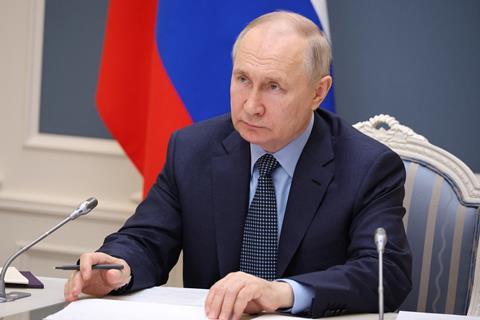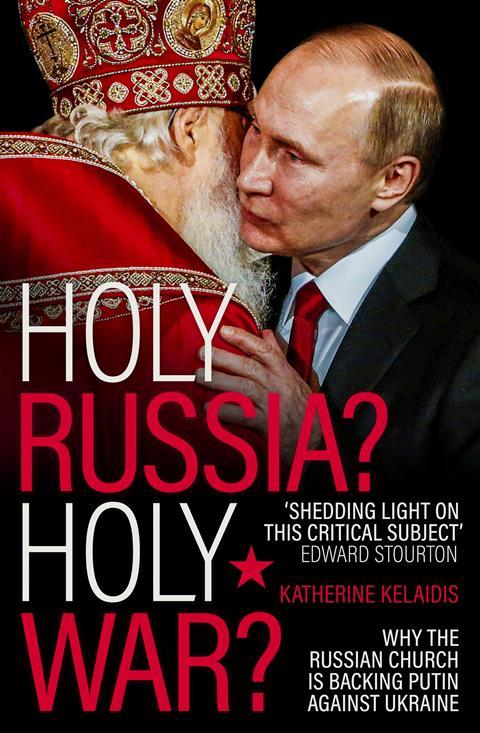Historian Katherine Kelaidis explains why the Russian Church is standing by the country’s leader’s decision to invade Ukraine.

It sounds like something from the time of the Tsars: On a wintry evening in 1952 a baby was taken by his pious grandmother through the frigid streets of St Petersburg to an underground church. There Friar Mikhail, whose own father had spent the previous three decades in Siberian gulags for his refusal to compromise his faith, baptised the baby into the Russian Orthodox Church, his own six year old son serving as the sole acolyte.
The baby would become Vladimir Putin, the President of the Russian Federation. The little altar server would one day be Patriarch of Moscow and All Rus. Together the two men would lead a great revival of Holy Russia, reclaiming the rightful place of the Motherland and the Mother Church in the world.
The story defies credulity (and rightfully so, it is almost certainly untrue), but this has not stopped it from becoming widely told in Russia. The very fact this tale exists points to the reinvigorated relationship between church and state in modern Russia. Such an alliance was not inevitable.
The Church was trusted which made it a potentially valuable ally for any Russian looking for power.
When the Soviet Union collapsed in the early 1990s, the Russian Orthodox Church was broken and impoverished, but it was also one of the only public institutions that had any trust. This was because, while the persecution of the Russian Orthodox Church in the Soviet Union was widely remembered, its collaboration was equally ignored. This trust made the church a potentially valuable ally for any Russian looking for power.
Both Boris Yeltsin and Patriarch Alexy, the first Russian Patriarch after the collapse of Communism, seemed to lack either the political savvy or the desire to make such an alliance a possibility. It was not until 2009, nearly a decade into the Putin Era, when the death of Alexy, brought Kirill to the patriarchal throne that the ancient partnership between Russian autocrat and Russian chief bishop began to reemerge. Learning valuable lessons of modern political wrangling from conservative American Evangelicals, the two began using the language of “traditional values” and “the family” in tandem, not only to sure up their base in Russia, but as part of an effort to bring Russia back to a place of global prominence. The Russian Orthodox Church, with its nearly global network of parishes, monasteries, and seminaries, has thus become an important weapon of Russian soft power abroad.
Read more on Russia and Ukraine
It’s terrifying in Ukraine, but God is giving daily miracles that lift people’s spirits
How to speak to your children about the war in Ukraine according to a psychologist
In some places, like Ukraine, where the largest and only recognised Orthodox church was officially under the authority of Moscow, this new partnership was a major problem from the beginning. Hence, the Ukrainian government began petitioning the Patriarch of Constantinople to create an Orthodox church in Ukraine not tied to Russia, a request that was granted in late 2018. The Patriarch of Moscow and the Russian state reacted with fury and Patriarch Kirill and his synod issued a decree that many characterize as initiating schism between the two most powerful bishops in the Orthodox world.

Consequently, fewer than four years later, as the full scale Russian invasion of Ukraine began, Patriarch Kirill had plenty of reasons to throw support behind the invasion. Which he has, bringing the Russian Orthodox Church with him.
Using nearly apocalyptic language, the Patriarch of Moscow and not a few of his clergy have described the war in Ukraine as a battle between good and evil.
Using nearly apocalyptic language, the Patriarch of Moscow and not a few of his clergy have described the war in Ukraine as a battle between good and evil, in which Russia is clearly on the side of the good. These are powerful words from a powerful man. Especially as the war drags on and the war turns against Russia, one cannot underestimate the value of this support. Patriarch Kirill, who most certainly was not, despite the whispers, at Vladimir Putin’s baptism, has baptised his war.
Holy Russia Holy War by Katherine Kelaidis is out in May 2023, with SPCK Publishing. Get more information here.






























No comments yet